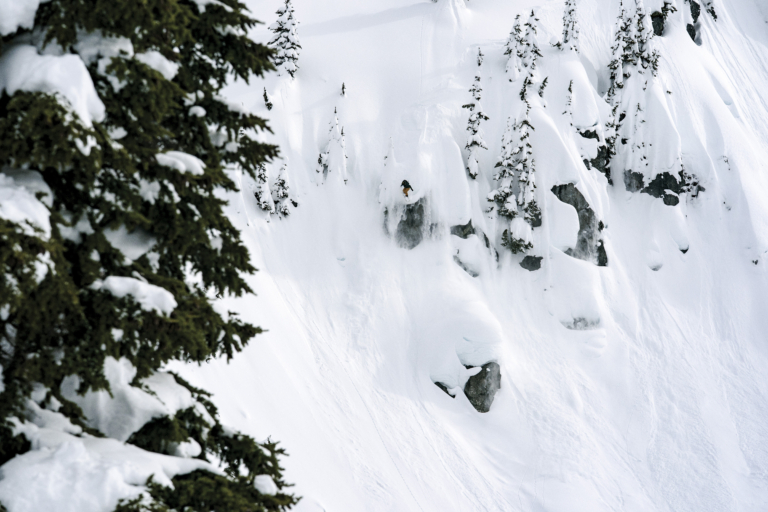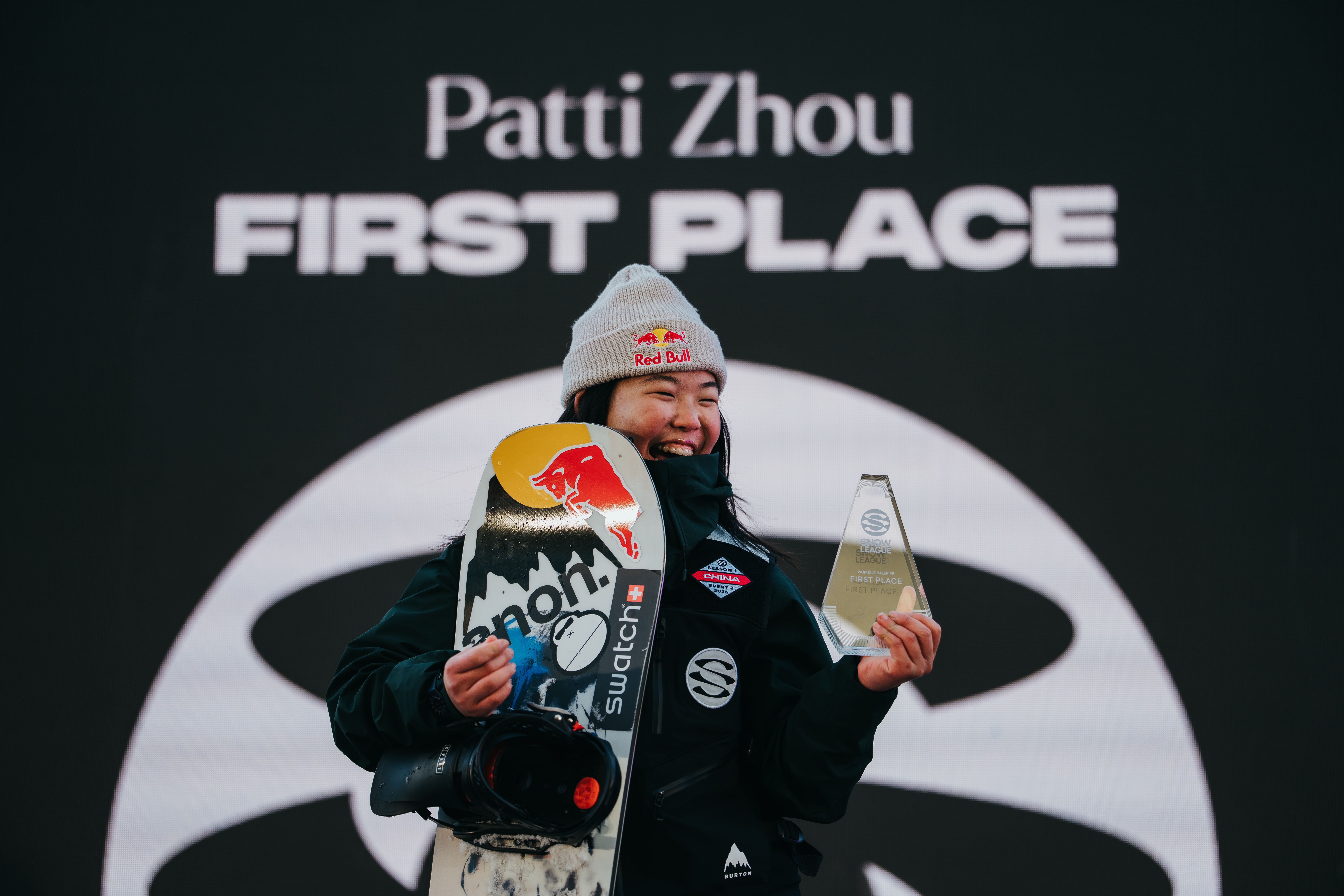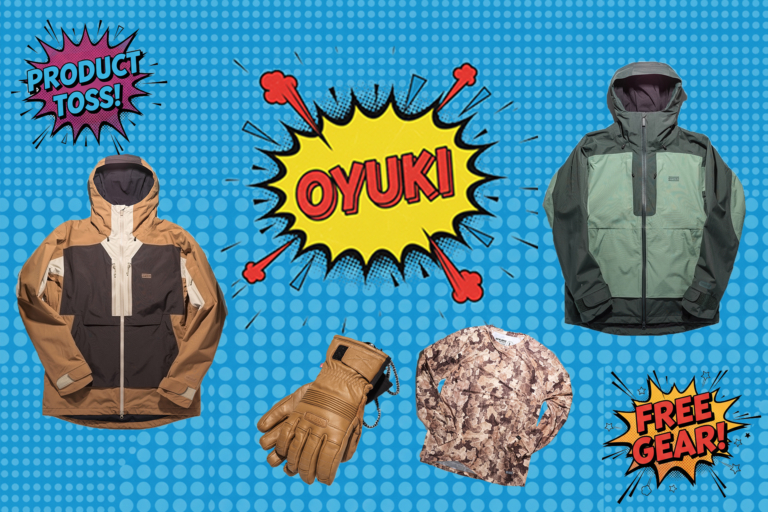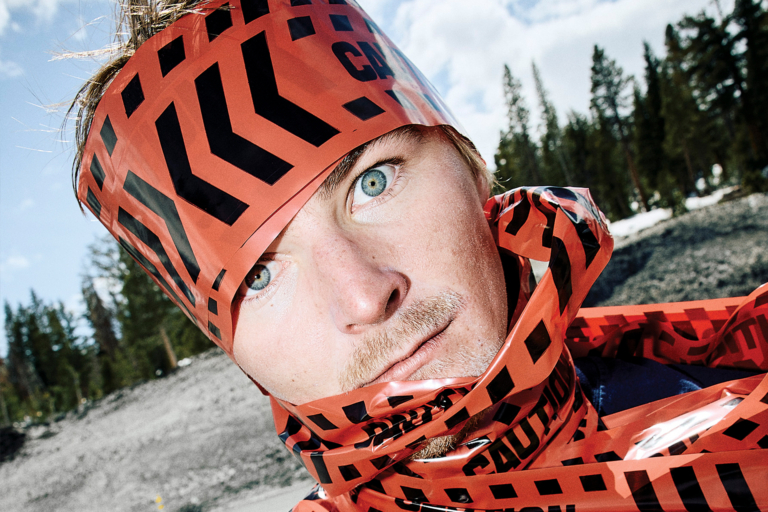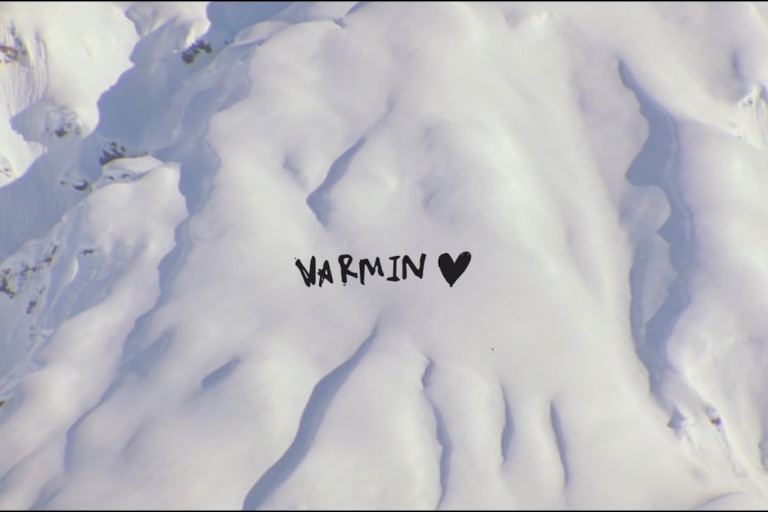Having a child wasn’t something that Jeff and I had planned. I never really saw myself as a mother, so I definitely struggled mentally for the first twelve weeks of pregnancy as we were waiting to see if it was a go or not—because I also was a little bit older becoming a mom, we were doing all the genetic testing. I just always thought that there was something wrong that was going to happen. Then it didn’t and we were like, “Okay, we’re ready to accept this is our new direction in life.”
I was super stressed out, just with my career, wondering what was going to happen, not knowing the future. It was around September that I got pregnant and in January I had to inform sponsors—after you get through that twelve-week process. I was super nervous to tell sponsors because I just automatically assumed that they might think I was done as a pro snowboarder, where in fact, I felt like I was just hitting my stride in the backcountry.
So I had a lot of anxiety, for sure, but with Kimmy Fasani and Maria Thomsen both being able to be a mom and an athlete, I think that they normalized motherhood a bit. The strides that they have made in snowboarding have definitely made it a little bit easier on me and I had a pretty good response from sponsors. At the time, I was thinking, I’m going to be okay this whole season to ride.
The doctor said, “This is great timing. You should be able to pull a full season together.” In my mind, I was going to approach pregnancy by seeing what I could do and not worry about what I couldn’t, because society throws out all these rules of what you shouldn’t do when you’re pregnant. High risk snowboarding is definitely one of those things that isn’t really encouraged, ha. I went in with the intention of going to Natural Selection and competing. I actually informed Travis [Rice] and Liam [Griffin] two weeks before and said, “Hey, I’m pregnant. I just want you to know that I would love for you to have an alternate just in case I pull out, and I’d love for the ball to be in my court of whether I compete or not.” They were super cool with that idea.

Unfortunately, the conditions were so terrible, the snow just wasn’t worth the risk of falling. I pulled out last minute and it was rad to see Stefi Luxton get in there. From there, I went to Alaska and we got skunked. I got back home and had my twenty-week scan, and they told me that I had placenta previa and I had to be bedridden for a couple months. Placenta previa is the most high-risk thing you can have for pregnancy. I was so grateful that I didn’t actually end up competing in Jackson because had I fallen, I could have done something pretty major. I could have bled out.
This definitely shifted my perspective on being pregnant to Okay, I am not in control. I went in with the idea and that attitude that, Yeah, I’m pregnant, but I’m going to be this athlete the whole time and be totally fine. And then your body just… Every pregnancy is different. I had a lot of strain on my pregnancy and a lot of risk that came up. I was also super anemic, so I was exhausted and had to get iron infusions to up my energy. I was unbelievably nauseous the whole time, too. I couldn’t really go a day without getting sick. It was really tough to go through a season where I was supposed to perform as an athlete of the highest level and just feel awful the whole time.
It was really rough, having your identity stripped away as an athlete, as a human that thrives on activity. Taking that away, and then also the worry of potentially not having a career, you enter into this new realm of something that is so different from what you’re used to and you can’t prepare for it in any way. To me, pregnancy was way harder than actual motherhood.
The best preparation I had for motherhood was snowboarding because when you’re snowboarding, you’re basically waiting on Mother Nature to grant you access to ride powder and you never know when that’s going to happen. I feel like with pregnancy and giving birth, the best kind of plan was no plan. You’re just waiting on your body to do things and then you’re reacting. When I went to the hospital, they asked, “What’s your birth plan?” I said, “I actually don’t have a birth plan. This is exactly like a backcountry day. I’m going to go with the flow, see what happens, and make decisions as they come.” So I went into five days of induction and nothing was happening. Then finally the doctor said, “You have to get a C-section.” And when I got a C-section, they cut into me and I lost half my blood. I was barfing, I was shaking. Jeff started freaking out. He was worried for my safety of surviving.
They gave the baby to Jeff and they rolled him into this recovery room, and he had the first moments with the baby. They stitched me back up and I ended up getting two blood transfusions. Giving birth is the craziest moment of your life and you can’t force a plan. It’s not going to work. I felt, in retrospect, that it is similar to snowboarding because of that; it was the one thing that I could kind of relate to.
It was just really tough going through mentally that year of being pregnant, feeling sick, not being able to do anything. And also I had the fear of, “I don’t even know if I’m going to like motherhood. This was a surprise. Are we making the best decision of our lives or is it the worst?” I just didn’t know.
When the baby came, we were on such a high. It is insane how high you feel after giving birth, and your partner gets the same rise of endorphins after the birth. It’s really cool. Jeff and I were so psyched. It’s mind blowing how you can love something so much. We were super, super happy that it all worked out and we are now parents. There are tough moments, but he’s been a dreamboat sleeper.
Now that I’ve gone through it, I feel like I can definitely live a life in the mountains, have a kid, and carry a career. I think it’s going to be hard this winter. I definitely have stresses about childcare. Jeff and I like to work in the mountains together, so we’ll have to find a scenario there, but I think it is possible to be a mother and also work in the mountains. It’s just going to be a little bit more of a logistical situation.
It’s definitely different being a male snowboarder versus a female because my sponsors are probably thinking, “Okay, so what level do you think you’ll return back to?” And one thing that I realized after giving birth was that I still really want to get into the mountains. When I was pregnant, I had FOMO. This summer, I watched a snowboard movie and thought, Holy shit. I love snowboarding so much. I definitely am not quitting.
I love my child so much, too, but I need to live a life of balance and for me, that means moving my body. And my favorite thing that I love to do is snowboard. So we’re going to figure it out. I have no plans of taking a step back because I think I can do it all. I can ride big lines and have this appetite for the mountains and be safe—and be able to come home and still have a family life.
Snowboarding isn’t a thing that I do for an accomplishment. It’s something that I do because I love being in the mountains, and that’s something that I’m so excited to share with little Khyber. Khyber’s is the creek run from Whistler. It’s a pow run. I actually shredded Khyber’s at eight-and-a-half months pregnant. So, we named him after that. I’m so excited to share our lifestyle with him moving forward; it makes life a little bit more fulfilling now that we’re navigating things as parents.
As told to Mary T. Walsh.
This article originally appeared in Fear Feature in issue 19.2.

